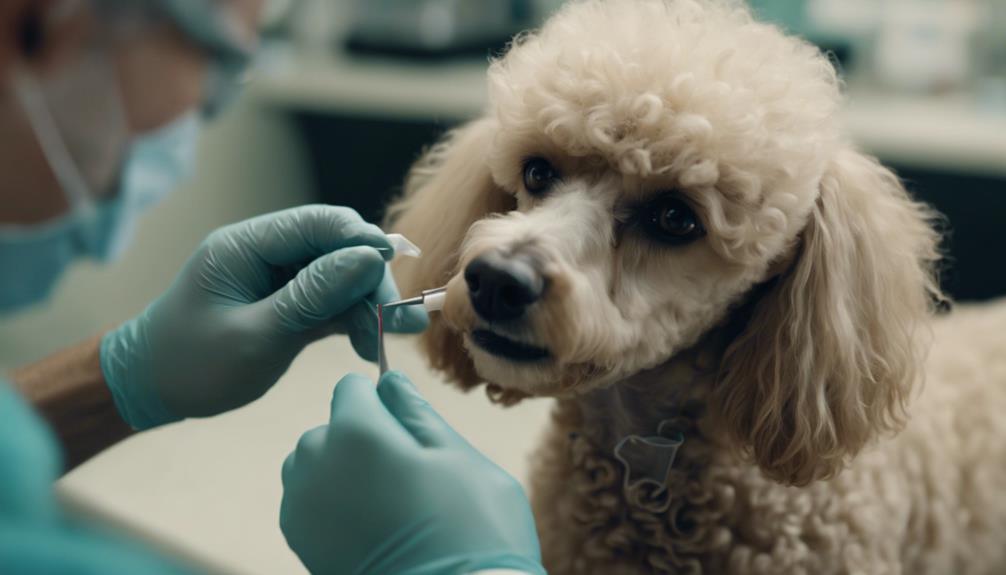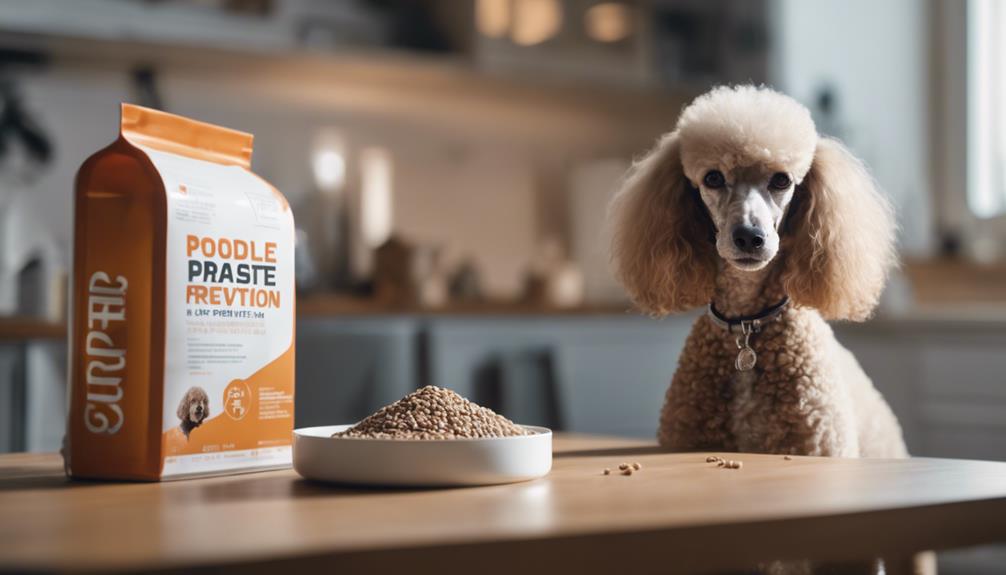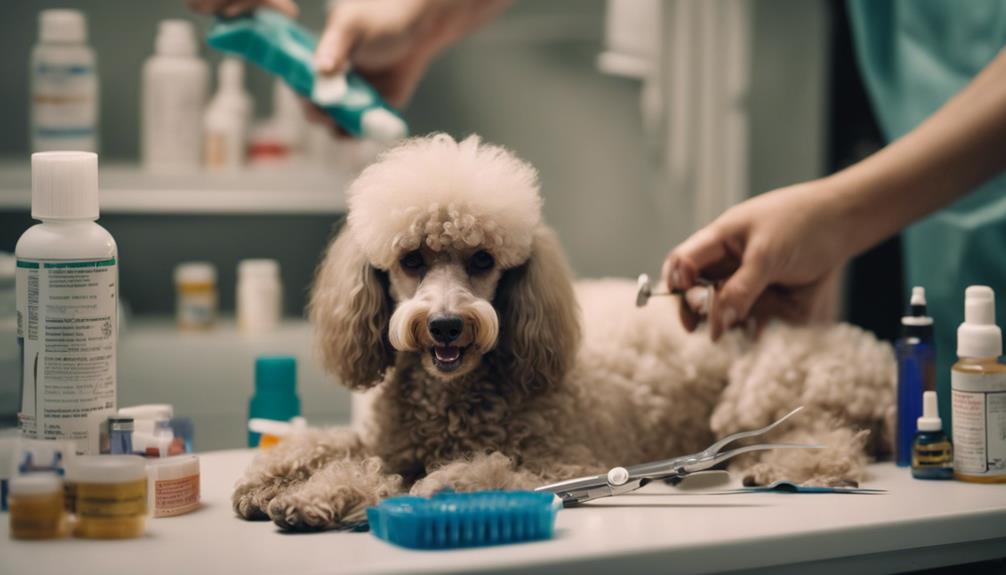When it comes to your Poodle's well-being, navigating the realm of parasites can be a bit like walking through a minefield. Fleas, ticks, and worms pose significant threats to your furry companion's health, and being equipped with the right knowledge and strategies is paramount. Understanding how to spot early signs of infestation and implementing preventative measures are crucial steps in safeguarding your Poodle from these pesky intruders. Stay tuned to discover effective ways to protect your beloved pet from the dangers that parasites can bring.
Key Takeaways
- Regular preventive measures like flea and tick preventives are crucial for safeguarding Poodles' health.
- Identifying signs of infestations and implementing effective treatment methods is essential for Poodles' comfort.
- Administering timely deworming protocols helps in preventing worm infestations and maintaining overall well-being.
- Annual parasite testing and vigilant care are key to ensuring Poodles are free from common parasites and diseases.
Understanding Poodle Parasites

When dealing with parasites in Poodles, it is crucial to understand the various types that can affect your furry companion. Fleas, ticks, and worms are common parasites that can pose serious health risks to your Poodle. Fleas not only cause skin irritation and allergic reactions but can also lead to discomfort and potential health issues if left untreated. Ticks, on the other hand, can transmit diseases like Lyme disease, which can be harmful if not promptly removed and treated. Intestinal worms such as roundworms and hookworms can also impact your Poodle's overall health, manifesting symptoms like diarrhea and weight loss.
To safeguard your Poodle from these parasites, it is essential to implement regular preventive measures and deworming protocols. These preventive measures may include using flea and tick preventives, keeping your Poodle's living environment clean, and administering deworming medication as recommended by your veterinarian. By staying proactive and vigilant, you can help protect your beloved Poodle from the harmful effects of parasites and maintain their well-being.
Identifying Flea Infestations

When checking your poodle for flea infestations, pay attention to signs like flea dirt, red skin, and excessive scratching. Identifying flea eggs and recognizing symptoms of flea bites are crucial in early detection. Regular grooming and using a fine-tooth comb can help you spot fleas before the infestation worsens.
Flea Eggs Identification
To identify flea infestations, look for tiny, oval-shaped, and white flea eggs that resemble grains of salt or dandruff on your poodle's fur or in their living environment. Identifying flea eggs is crucial in detecting infestations early for prompt treatment. Below is a table to help you distinguish flea eggs from other debris:
| Characteristic | Flea Eggs |
|---|---|
| Size | Tiny |
| Shape | Oval-shaped |
| Color | White |
| Resembles | Grains of salt or dandruff |
Flea Bite Symptoms
Identifying flea infestations in poodles can be done by recognizing the symptoms of flea bites, which include intense itching, redness, and small red bumps on the skin. Poodles may exhibit excessive scratching, biting, and licking as a result of flea bites. Additionally, the presence of flea dirt or feces on the skin can indicate a flea infestation. Poodles with flea problems may develop hot spots or skin infections due to constant scratching. Regular grooming and inspection are crucial for early detection of flea infestations in poodles. By maintaining a grooming routine and promptly addressing any signs of itching or redness, you can help keep your poodle free from the discomfort and health issues caused by fleas.
Tackling Tick Troubles

To effectively manage tick troubles in your poodle, implementing tick prevention methods is crucial. Regularly using tick preventatives, such as chewable medications, can significantly reduce the risk of tick-borne diseases. Additionally, mastering proper tick removal techniques is essential for safeguarding your poodle's health and well-being.
Tick Prevention Methods
Consider safeguarding your poodle against tick infestations by implementing monthly chewable preventatives from April to October to ensure their protection. These preventatives are crucial in preventing ticks from latching onto your beloved pet and potentially transmitting diseases. Remember, it's essential to remove ticks completely by the head to minimize the risk of disease transmission. After removing a tick, testing your pet for tick-borne diseases is recommended for early detection and prompt treatment. If you plan on traveling to areas where ticks are prevalent, make sure to treat your pet beforehand to prevent infestations. Tick prevention plays a vital role in maintaining your dog's health and well-being, especially in regions where ticks are common.
| Prevention Methods | Description |
|---|---|
| Monthly Preventatives | Administer chewable preventatives from April to October. |
| Tick Removal | Remove ticks completely by the head to prevent disease transmission. |
| Testing | Test pets for tick-borne diseases post-removal for early detection. |
| Pre-Travel Treatment | Treat pets before traveling to endemic areas to prevent infestations. |
| Importance | Tick prevention is crucial for your dog's health in tick-prone areas. |
Tick Removal Techniques
When tackling tick troubles, ensure you use fine-tipped tweezers to grasp the tick as close to the skin's surface as possible. Remember to pull upward with steady, even pressure, ensuring the tick's mouthparts are removed to reduce the risk of infection. Avoid twisting or jerking the tick, as this can lead to mouthpart breakage and increase the likelihood of infection. After removing the tick, disinfect the bite site and wash your hands thoroughly. It is crucial to monitor the bite site for any signs of infection or rash development in the following days.
- Use fine-tipped tweezers for proper removal.
- Pull upward steadily to ensure mouthparts are extracted.
- Avoid twisting to prevent infection risk.
Worm Worries in Poodles

When dealing with worm worries in Poodles, it is essential to understand the impact these intestinal parasites can have on your pet's health. Poodles, being susceptible to roundworms, hookworms, and whipworms, can experience symptoms like diarrhea, weight loss, vomiting, and lethargy when infected. Moreover, these intestinal parasites can also be transmitted to humans, underscoring the necessity of adhering to deworming protocols for your Poodle's health and the well-being of your family.
To safeguard your Poodle from these parasitic infections, regular deworming is highly recommended, especially for young Poodles and those with outdoor access. By promptly treating and taking preventive measures against intestinal worms, you can ensure your Poodle remains healthy and happy. Remember, prevention is key when it comes to protecting your furry companion from the potential harm caused by these pesky parasites. Prioritizing your Poodle's deworming schedule is a vital aspect of responsible pet ownership.
Preventing Flea Infections

To prevent flea infections in your poodle, it is crucial to implement effective flea prevention methods like topical treatments or collars. These measures can help keep your poodle free from fleas and protect them from potential health issues caused by flea infestations. Regular use of flea prevention products is key to maintaining your poodle's well-being and ensuring they remain healthy and comfortable.
Flea Prevention Methods
Flea prevention methods for poodles encompass a range of products such as collars, powders, sprays, shampoos, and monthly spot-on topical medicine to safeguard against infestations caused by these pesky parasites.
- Regular Use: Consistent application of flea prevention products is essential to protect your poodle from the discomfort and health issues associated with fleas.
- Environment Maintenance: Keeping your living area clean and vacuumed helps to prevent flea infestations.
- Consultation: Consult with your veterinarian to determine the most effective flea prevention method for your poodle's specific needs.
Flea Treatment Options
To effectively protect your poodle from flea infections, it is crucial to explore a variety of treatment options such as collars, powders, sprays, shampoos, and dips designed specifically for preventing these pesky parasites. Monthly spot-on topical medicines are highly effective in preventing flea infestations in poodles. Fleas can cause itching, hair loss, and transmit tapeworm eggs to poodles if not treated promptly. Effective flea treatment is essential to keep poodles comfortable and healthy. Remember, precautions should be taken even in areas where fleas are not a significant problem, like Reno, to protect poodles from flea infections. Stay proactive in your flea prevention efforts to ensure your poodle remains happy and healthy.
Tick Prevention Methods

Tick prevention methods for poodles involve administering monthly chewable preventatives from April to October to protect against tick-borne diseases. These preventatives are crucial in safeguarding your poodle from illnesses transmitted by ticks. Additionally, there are other essential practices you can incorporate into your tick prevention routine:
- Proper Tick Removal: When removing ticks, ensure to extract them entirely from your poodle's skin, particularly the head. Complete removal can help prevent diseases such as Lyme disease and Rocky Mountain spotted fever.
- Post-Removal Testing: After removing a tick, consider having your pet tested for tick-borne diseases. Early detection through testing can facilitate prompt treatment and management of any potential infections.
- Preventative Measures Before Travel: If you plan to travel with your poodle to areas where ticks are prevalent, it is advisable to administer tick preventatives before the journey. This preemptive action can significantly reduce the risk of tick infestations.
Deworming Poodle Guidelines

When it comes to deworming your Poodle, following a proper schedule is crucial. Understanding the types of dewormers available and how they work is essential for your dog's health. Stay informed about the recommended guidelines to keep your Poodle parasite-free and thriving.
Worming Schedule Tips
For optimal parasite control in Poodles, it is essential to adhere to a strict deworming schedule. Here are some worming schedule tips to help you maintain the health of your Poodle:
- Deworm Poodle puppies every 2 weeks until 12 weeks of age to target common intestinal parasites effectively.
- Ensure adult Poodles are dewormed every six weeks for life to uphold parasite control and prevent issues like diarrhea, weight loss, and vomiting.
- Consider more frequent deworming for outdoor Poodles or those with higher exposure to address increased parasite risks and reduce the chance of zoonotic transmission to humans. Regular deworming plays a crucial role in keeping your Poodle healthy and free from harmful parasites.
Types of Dewormers
To effectively address parasitic infections in your Poodle, understanding the types of dewormers available is crucial for maintaining your pet's health and well-being. Dewormers for Poodles, such as Milbemycin, Praziquantel, and Pyrantel, are designed to target specific parasites like roundworms, hookworms, and tapeworms. The choice of dewormer should be based on the type of parasite your Poodle is affected by. Additionally, some dewormers not only treat worms but also provide protection against other parasites like heartworms and fleas. Deworming frequency for Poodles varies depending on their lifestyle, exposure levels, and individual risk factors. It is highly recommended to consult with a veterinarian to determine the most suitable deworming schedule and product selection for your Poodle's specific needs.
Testing for Parasitic Infections

Regular annual fecal exams are essential for detecting intestinal parasites in Poodles. These tests help in identifying any parasitic infections early on, allowing for prompt treatment and prevention of potential complications. In addition to fecal exams, heartworm testing is crucial before initiating preventive measures in Poodles. Tests like the 4DX conducted in clinics can screen for heartworm and tick-borne diseases, providing a comprehensive overview of your Poodle's health status. Regular testing is a vital component of maintaining your Poodle's overall well-being and ensuring they lead a healthy, parasite-free life.
- Annual fecal exams aid in the early detection of intestinal parasites.
- Heartworm testing is necessary before starting preventive treatments.
- In-clinic tests like the 4DX screen for heartworm and tick-borne diseases.
City Dog's Prevention Protocols

Screening and deworming are key elements of City Dog's Prevention Protocols, focusing on safeguarding Poodles against common parasites such as fleas, ticks, and worms. City Dog recommends using monthly preventatives like Proheart (Moxidectin), Capstar (Nitenpyren), and Simparica (Solaner/moxidectin/pyrantel) to target these parasites effectively. These preventatives are crucial in protecting Poodles from serious threats like heartworms, tapeworms, and tick-borne diseases. By following City Dog's prevention protocols, which emphasize regular screening and deworming, Poodle owners can ensure the optimal health and well-being of their pets. City Dog tailors customized prevention plans to address the unique needs of each Poodle based on lifestyle and risk factors. Adhering to these protocols not only helps manage and control parasites like fleas, ticks, and worms but also plays a vital role in keeping Poodles healthy and happy. Trust City Dog's expertise to provide your furry companion with the best preventive care against these harmful parasites.
External Parasite Management Tips

When managing external parasites in Poodles, it is essential to implement a comprehensive approach that includes regular grooming and the use of effective preventive measures recommended by veterinarians. Here are some tips to help you effectively manage external parasites in your Poodle:
- Regular Grooming: Maintaining a consistent grooming schedule can help in early detection of fleas and ticks, allowing for prompt action to be taken.
- Tick Checks: Perform daily tick checks, especially after outdoor activities, to ensure timely removal of any ticks that may have latched onto your Poodle.
- Parasite Prevention: Utilize flea and tick collars, topical medications, or oral preventatives as recommended by your veterinarian to protect your Poodle from flea infestations and tick-borne diseases.
Internal Parasite Prevention Strategies

To effectively safeguard your Poodle from internal parasites, consistent deworming treatments targeting common intestinal worms like roundworms, hookworms, and whipworms are essential. Annual fecal exams play a crucial role in early detection, allowing prompt treatment. Heartworm prevention is a key component of internal parasite prevention, as Poodles are vulnerable to this potentially fatal parasite spread by mosquitoes. Monthly heartworm medications such as ProheartMoxidectin are highly recommended to protect your Poodle from heartworm infections and associated health risks. By following a personalized parasite prevention plan advised by veterinarians, you can effectively shield your Poodle from internal parasites and ensure their overall well-being. Remember, proactive measures like regular deworming, annual fecal exams, and monthly heartworm medications are fundamental in preserving your Poodle's health and happiness. Stay diligent in implementing these preventive strategies to keep your beloved furry companion safe from internal parasites.
Recognizing Parasite Symptoms

As you observe your Poodle closely for any changes in behavior or physical appearance, it's crucial to be vigilant for signs that may indicate a parasite infestation. Parasites like ticks, which can transmit diseases such as Lyme disease, and worms can impact your Poodle's health. Here are some key symptoms to watch out for:
- Itching: Persistent scratching or biting at the skin can be a sign of fleas, ticks, or other parasites causing irritation.
- Weight Loss: Unexplained weight loss in your Poodle could be a symptom of a worm infestation, especially if accompanied by other signs like diarrhea.
- Visible Ticks: If you notice any ticks attached to your Poodle's skin, it's essential to remove them carefully and monitor for any signs of Lyme disease transmission.
Being aware of these symptoms and promptly addressing any concerns with your veterinarian can help in diagnosing and treating parasite infestations effectively. Regular grooming and inspection play a vital role in maintaining your Poodle's health and well-being.
Treating Common Poodle Parasites

Dealing effectively with common parasites in Poodles requires a targeted approach that addresses specific infestations to ensure your pet's health and well-being. Fleas are a common issue that can lead to itching, skin irritation, and even tapeworm infestations if left untreated. Regular grooming and thorough inspection of your Poodle's fur can help in detecting and preventing flea infestations. Ticks are another concern as they can transmit diseases such as Lyme disease and Rocky Mountain spotted fever to Poodles. Additionally, worms like roundworms, hookworms, and tapeworms can cause digestive problems and impact your Poodle's overall health.
To combat these parasites, consult with a veterinarian to establish a tailored prevention plan based on your Poodle's specific needs and lifestyle. Prevention is key in safeguarding your pet from these common parasites. By staying proactive and following preventive measures, you can help keep your Poodle healthy and parasite-free.
Comprehensive Parasite Control Measures

Combatting parasites in Poodles requires a comprehensive approach that includes regular grooming, vet-recommended preventatives, and tailored deworming protocols to ensure your pet's well-being and health. To effectively control fleas, ticks, and worms in your Poodle, consider the following:
- Regular Grooming and Inspection: Poodles' dense coats make them susceptible to parasites; therefore, consistent grooming and thorough inspection can help in early detection and prevention.
- Vet-Recommended Preventatives: Utilize flea and tick preventatives recommended by your vet to protect your Poodle from these external parasites and ensure comprehensive parasite control.
- Tailored Deworming Protocols: Implement deworming protocols that are specific to Poodles' needs to manage and prevent intestinal parasites effectively.
Frequently Asked Questions
How Can I Treat My Dogs Parasites at Home?
To treat your dog's parasites at home, consider natural remedies like apple cider vinegar baths, DIY treatments such as garlic supplements, preventive measures like regular grooming, and herbal supplements such as neem oil. Always consult your vet for guidance.
Can Dogs Get Rid of Parasites on Their Own?
You can't expect dogs to eliminate parasites on their own; they need specific treatments. Natural remedies may help, but parasite prevention, behavioral changes, and boosting the immune system are key. Consult a vet for effective solutions.
Can I Treat My Dog for Worms Without Going to the Vet?
You should not treat your dog for worms without consulting a vet. Home remedies, over-the-counter options, and DIY solutions may lack effectiveness or safety. Natural treatments can vary in success rates, but precautions are vital for your pet's well-being.
What Are the Symptoms of a Dog With a Parasite?
If your dog shows behavioral changes, like restlessness or excessive scratching, along with lethargy and unexplained weight loss, it may have parasites. Keep an eye out for visible signs such as worms and contact your vet promptly.
Conclusion
In conclusion, keeping your Poodle free from parasites like fleas, ticks, and worms is essential for their overall health and well-being. By implementing preventive measures such as regular treatments and deworming protocols, you can protect your furry friend from potential health issues. Remember to stay vigilant, recognize symptoms early, and consult with your veterinarian for the best course of action. With proper care and attention, you can ensure your Poodle leads a happy and healthy life.
